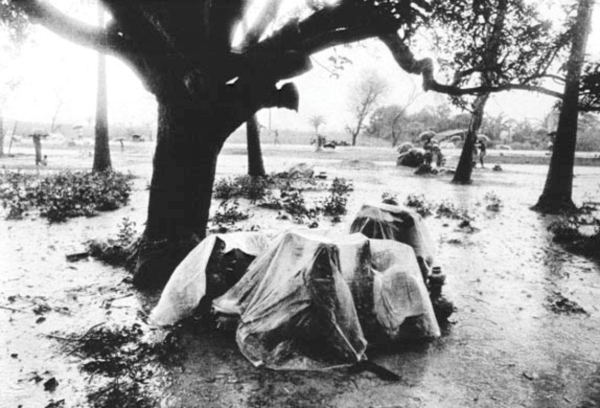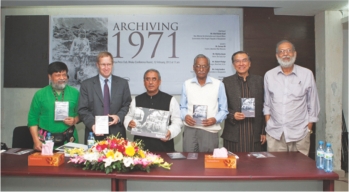
Photo: Don Mccullin
Archiving?1971
By Sharmin Ahmed
Star Weekend
Winston Churchill said, ?History is written by the victors.? And when history is one-sided, it becomes a propaganda instrument. Archiving is a form of respecting not only history but the truth, and it is with the motive of promoting the truth that documentation of history must be done. ?Archiving 1971?, a programme by Drik to collect oral, textual and visual resources to establish a one stop repository of the historical 1971 War of Liberation for Bangladesh began on that promise
The aim is to bring together a team of researchers, social scientists, historians, archivists and other professionals to assemble definitive archives of this important chapter in the country’s history. The 10-year plan includes not only collating materials from across the world but also generate the economic resources necessary to build permanent physical archives. It will help academics, researchers and others to make rigorous analysis and draw inspiration from the repository.
 |
|
|
The ?Archiving 1971? event at which a book and documentary film was introduced.
|
|
 |
|
|
Afsan Chowdhury discussing the importance of archiving.
|
During the ‘Archiving 1971’ event, which wants to share with the public the aims of the programme, Afsan Chowdhury, who has been active in multi-disciplinary research, journalism, and is one of the editors of an authoritative work on Bangladesh’s War of Independence, discussed the importance of archiving on a video conference with Sophia Balagamwala, Director of Interactive Projects at the Citizens Archive of Pakistan. Chowdhury explained how seminal it was to document historic events for the future generation, especially those living in Bangladesh. ?There are so many aspects of the war that need to be thoroughly analysed, from which much can be learnt, especially the politics of the war, and the need for a compilation from both sides of the historic event is also very important,? he said.
Dr Shahidul Alam, Managing Director, Drik said, “History writing and collection are two different things but they are both necessary. It is important that we gain proper knowledge about what really happened in 1971.? In that way we would not make our history merely an issue of propaganda but would be able to know facts about it. We can make sure that the next generations of Bangladeshis do not grow up to become ultra-nationalists -a generation who claims to be patriotic but, given their mindset, seems to be extremists and rather remain well grounded in understanding our War of Liberation.
‘The Birth Pangs of a Nation’, a documentary film on the 1971 Liberation War, was made, which focuses on the refugees of the war. Craig Sanders, representative of the United Nation High Commissioner for Refugees (UNHCR) in Bangladesh, said, “Those who do not learn from history tend to repeat it, and for this reason there is urgency to the programme. As we are all aware of the current Myanmar refugee situation here in Bangladesh that UNHCR is trying to deal with, it is a crucial documentary to watch and learn from.”
The diversity of the images truly captures our heroic struggle for freedom. The initiative itself is commendable and is much needed. When one sees the images of 10 million refugees fleeing, beaten down hard by the pouring of rain, the silent continuous streaming of tears of loss, only then does one understand the true cost of 1971’s war of freedom. It also portrays the return of refugees and the situation of post 1971 Bangladesh and touches on the troubled issue of the present day refugees.
Dr Sarwar Ali, one of the trustees of the Liberation War Museum said, ?It is very hard to find role models in our current leaders. The war is significant in that respect, because it is something we can draw inspiration from. So when we look back through our archives, we can be inspired by what we had to overcome in our struggle for freedom.” He also said that the process to preserve the documents, photographs and artefacts was difficult and proper techniques to preserve them were important.
A book was also published as part of the ‘Archiving 1971’ programme. Abul Kalam Azad, Minister of Information and Cultural Affairs said, ?We hope that the next generation can learn of the mistakes that have been made in the past through the archives of the liberation war, so that they may research on it and be inspired to achieve great things for the country.?
It is indeed seminal to preserve the nation’s history through archiving, given that 40 years after 1971 we still know little of the intricacies of the war because of lack of proper documentation and visual records. It is indeed urgent that we try to preserve the historic truths, do research and analyse them so that we can value the cost of our motherland’s birth, and strive to nurture it. As Dr Shahidul Alam said, “Given that our country runs on the labour of our farmers, foreign remittance earners and the RMG workers, if we cannot ensure their freedom, our liberation war has not yet been fought.?




Leave a Reply
You must be logged in to post a comment.